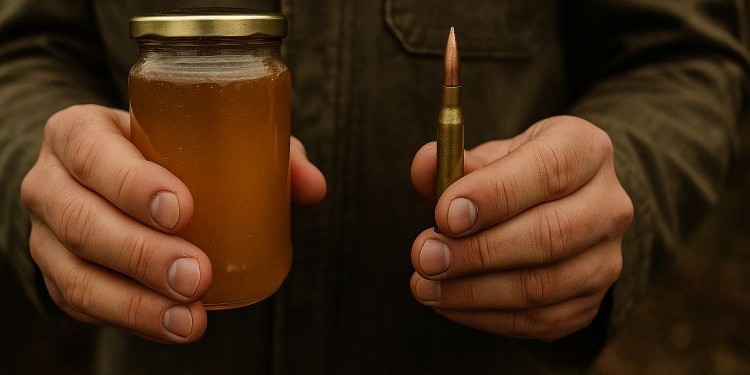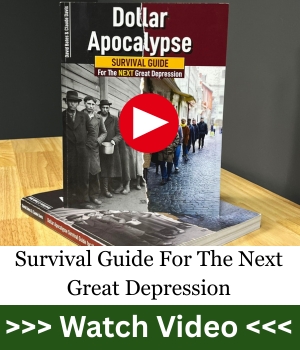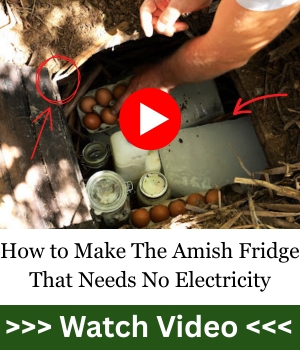When preppers brag about their setups, they talk about guns, water filters, bug-out bags, and stockpiles of beans. Fine, all good. But here’s the reality check: your stash will run out. Your ammo box will empty. Your garden won’t feed you if it doesn’t grow.
And there’s one skill that almost nobody talks about, yet it could be the difference between surviving a few months or rebuilding a life after the collapse. That skill? Beekeeping.
Sounds too soft? Too “homestead hobby” for your taste? That’s your first mistake. Bees aren’t about honey in tea. Bees are about food, medicine, trade, and the sustainability of your entire system. Ignore them, and your prepping strategy has a hole big enough to swallow you.
What most preppers don’t realize is that bees are workers you don’t have to pay, guard, or feed with anything but the wild world itself. While you’re worrying about defending a chicken coop or hauling water to a garden, bees are out there collecting nectar and bringing it straight back to your hive. They multiply your resources without taking anything away from your reserves.
And the best part? Once you have the skill, it sticks with you forever. Knowledge of bees doesn’t rust, doesn’t expire, and can’t be stolen out of your pantry. It’s the kind of prepper advantage you pass down to your kids while the rest of the world fights over scraps.
Honey: Food That Outlives Empires
When people panic about sugar shortages, you won’t blink. Why? Because honey is the only natural food that literally never spoils. Archeologists have found pots of honey in Egyptian tombs still perfectly edible after 3,000 years.
You can eat it straight, mix it with grains, bake with it, ferment it into mead for morale, or trade it like gold. It fuels your body with quick energy in a way no stale rice or dusty MRE can.
Honey also doubles as a morale booster. Sweetness is one of the first luxuries to vanish in collapse, and that spoonful of golden energy can calm nerves, lift spirits, and remind people of normal life. In survival, morale is fuel. Lose it, and you lose the fight.
And here’s the kicker: honey isn’t just for your family. It’s for your animals, too. Chickens, goats, and even dogs can benefit from its quick energy and medicinal properties in a pinch. That makes every jar not just survival food—but a lifeline for your whole system.
Medicine Hidden in a Hive
The pharmaceutical empire doesn’t want you remembering this, but honey was the original antibiotic.
- Smear it on a wound or burn and it seals out infection.
- Use it for coughs, sore throats, and gut health.
- Pair it with herbs and you’ve just built a pharmacy in your backyard.
Then there’s propolis—a resin bees make to seal cracks in the hive. It’s packed with antimicrobial, antifungal, and antiviral properties. In a collapse, that’s immune support Big Pharma can’t touch.
And don’t forget royal jelly. This is the nutrient-rich food fed to queen bees, and it’s long been prized as a tonic for stamina and immunity. While the rest of the world scrambles for antibiotics, you’ll have natural options that keep your family healthier for longer.
Beeswax is another overlooked treasure. Beyond candles and waterproofing, it’s the foundation for ointments, balms, and natural remedies. Pair beeswax with medicinal herbs, and suddenly your prepper kit includes pain relievers, antiseptics, and skin protectants that last far longer than drugstore products.
Pollination: The Silent Collapse Nobody Prepares For
Here’s a prepper blind spot nobody likes to admit: your survival garden is dead in the water without pollinators. No bees, no harvest. You’ll have flowers, not food.
Modern agriculture has propped itself up with industrial pollination, trucking hives across states to keep crops alive. In collapse, that system dies overnight.
Pollination isn’t optional—it’s the backbone of your food supply. Bees ensure your fruit trees, squash, beans, and herbs actually produce, turning seeds and soil into calories you can eat. Without them, you’re gambling with your survival every season.
And it doesn’t stop at food. Pollination keeps wild plants healthy, which means forage, firewood, and medicine stay abundant in your environment. Lose the bees, and you don’t just lose your harvest—you lose the ecosystem that feeds you.
Barter Value Stronger Than Silver
People hoard silver coins thinking they’ll barter like it’s 1890. Wake up. When society snaps, nobody’s trading bread for shiny rocks. They’ll trade for sugar, candles, and medicine.
And what does a beehive produce? All three.
- Honey: the sweetest barter good in existence.
- Beeswax: turns into candles, firestarters, sealants.
- Propolis: the survivalist’s medicine.
Honey has another advantage over metal: it’s consumable. Once someone eats it, they want more. That creates repeat demand, which is the backbone of any real barter economy. Silver just sits there. Honey keeps people coming back.
In desperate times, a pint of honey or a wax candle could mean more than an entire bag of coins. When light, sugar, and medicine are gone, bees make you the one person everyone else needs. That’s leverage no stash of bullion can match.
Self-Sufficiency and Sustainability
Here’s where it gets scary: most prepping plans are finite. Stored food runs out. Ammo disappears. Fuel gets used up. But bees? They forage for you. They turn wildflowers and weeds into renewable survival assets.
One hive can split into two. Two hives into four. Properly managed, your system grows every year without outside help. That’s the difference between consuming your stash and producing your future.
This is what separates short-term survivalists from long-term rebuilders. Stockpiles buy you time, but living systems buy you freedom. Bees transform your prepping from hoarding into regeneration, which is the only real way to outlast collapse.
And here’s the part nobody likes to hear: if you don’t build renewable systems, you’re just delaying starvation. Bees turn that clock into a cycle that renews itself. That’s survival that scales with time, not against it.
The Brutal Challenges
Now don’t get it twisted. Beekeeping isn’t easy.
- You need gear: suits, smokers, hive boxes.
- You need guts: because yes, you’re going to get stung.
- You need knowledge: weak colonies collapse, diseases spread, queens fail.
And sometimes you’ll lose hives, even when you did everything right. That’s the price of working with nature. But here’s the difference: skills are currency. Anyone can buy a pallet of wheat. Not everyone can raise bees.
Seriously consider getting Beekeeping for Beginners and The Beekeeping Bible to gain the knowledge you will need.
There’s also the risk of theft. In desperate times, a thriving hive becomes a target. Protecting your bees means treating them as both livestock and treasure. Your hive may be as valuable as your food stash—or more so.
Finally, climate and environment matter. Bees need forage, water, and proper placement. Learning how to manage them in your region takes trial, error, and commitment. But once you’ve got it, you’ve got something most preppers never will: a renewable edge that can’t be taken away.
7 Beekeeping vs. Other Prepper Skills: The Cold Comparison
| Prepper Skill | Pros | Cons | Long-Term Survival Value |
| Beekeeping | Produces honey (food), beeswax (light, trade), propolis (medicine), pollination for crops, renewable & expanding | Requires knowledge, gear, hive protection, risk of stings & colony loss | Extremely high – renewable food, medicine, and barter system that scales with time |
| Gardening | Direct food source, variety of crops, can be scaled up with land | Seasonal limits, soil & water demands, poor yields without pollination | High – but only sustainable long-term with pollinators like bees |
| Livestock (chickens, goats, rabbits) | Eggs, meat, manure, hides, renewable food | Requires feed, space, protection, higher maintenance | High – but feed sources collapse fast without planning |
| Stockpiling | Instant safety net, ready-made calories, security for short-term crises | Finite supply, takes space, runs out fast, theft risk | Medium – buys time but cannot sustain you long-term |
| Hunting/Fishing | Protein supply, can be done without much setup | Depletes quickly if everyone’s doing it, requires skill & ammo, not renewable | Low-Medium – works in short bursts, unsustainable in collapse |
Final Thoughts: The Forgotten Prepper Edge
Prepping isn’t about playing apocalypse dress-up. It’s about building systems that keep producing when everything else stops. Beekeeping is one of the few skills that hits every survival category: food, medicine, barter, sustainability, and morale.
Ignore it, and your prep plan has an expiration date. Learn it, and you’ve just given yourself a renewable edge most people don’t even think about.
The ugly truth? Your guns and your rice buckets won’t matter if you can’t produce more food when it runs out. Bees don’t just give you calories—they give you power. The kind of power that rebuilds communities while others starve.
When the shelves are stripped and the system’s gone, it won’t be the biggest guns or the deepest basements that decide who thrives. It’ll be the ones who still have bees.
You may also like:
9+ Foods That Kept Pioneers Well-Fed on the Oregon Trail
The Amish Friendship Bread (Video)
The Knife In Rambo – Good For Survival Or Not?























I wonder if bears will be a problem if you have a stash of hives in the woods ? I live in a populated area where raccoons will come through your back yard and tear up your garden for no reason looking for bugs i guess .This year birds have been very pesky , eating the seeds and sprouts that i plant . i had to get very creative with bird netting .I learn this year spraying a mixture of dish soap and water on a aphid infestation works well . Prepping has a learning experience process that’s for sure…..also my apple cider vinegar and 3 drops of dish soap in a jar with 3 small holes in the lid is working well for me to rid my house of fruit fly’s…i need to learn how to make a racoon stew and bird soup …freeze dried bugs……BBQ possum….snails….I added honey to my stock pile….as bait for the prepper looters…..and a big hacksaw!!!
Bears can definitely be a problem if you’ve got hives in the woods since honey is like a magnet for them, so if you’re in bear country you’ll want strong fencing or even electric deterrents. Raccoons and birds are trickier since they’re relentless, but it sounds like you’re already adapting well with netting, homemade sprays, and traps. That’s the essence of prepping, trial, error, and learning what works in your environment before you have to depend on it.
I like your resourceful spirit with the vinegar traps and the thought of turning pests into food sources if needed. That kind f mindset, where nothing goes to waste and every problem could become an opportunity, is exactly what keeps a prepper ahead. Keep experimenting, keep documenting, and you’ll build a set of skills far more valuable than just having gear stored away.